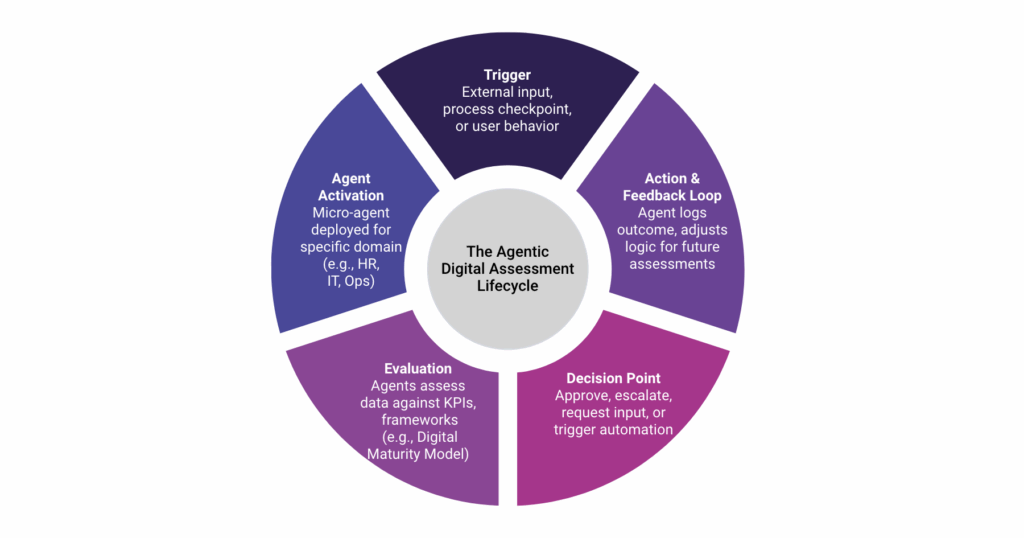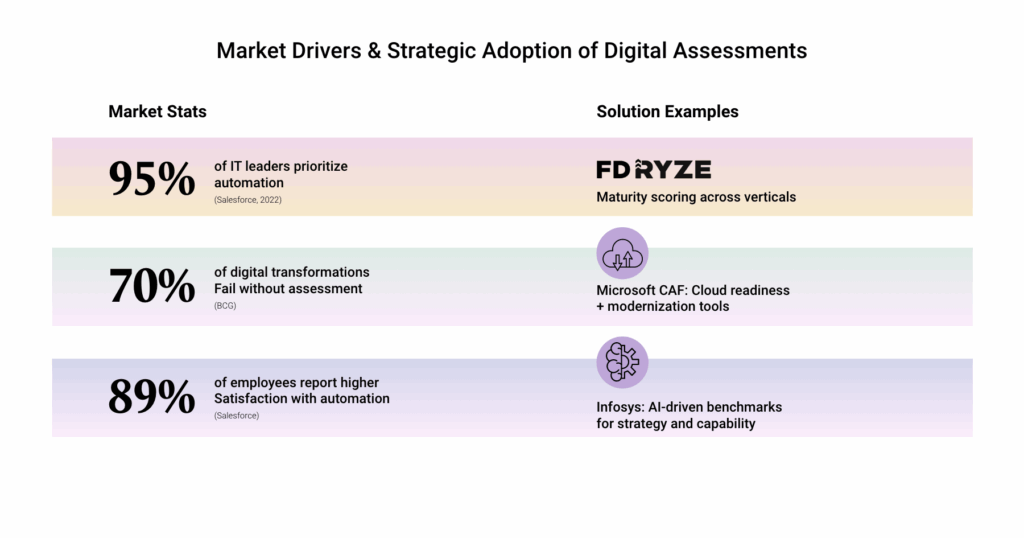Digital assessment uses agents to check readiness, gaps, or compliance with digital transformation benchmarks.
Digital assessment refers to the use of AI and automation to evaluate business processes, data, systems, or user input. In Agentic AI environments, digital assessments are orchestrated by autonomous agents that interpret, validate, and act on signals across enterprise workflows, making them critical for modern digital transformation journeys.
Detailed Definition & Explanation
A digital assessment is an intelligent evaluation process that uses digital tools—and increasingly, autonomous agents—to measure organizational readiness, operational gaps, or compliance with digital transformation benchmarks.
In traditional enterprises, digital assessments often took the form of manual audits or static checklists. Today, Agentic AI systems enable enterprise digital assessment through autonomous micro-agents that:
- Ingest structured and unstructured data
- Evaluate performance against KPIs, benchmarks, or models
- Make rule-based or AI-augmented decisions
- Trigger automated next steps (e.g., alerts, escalations, or workflow adjustments)
These agents operate across multiple domains, from digital platform assessment in IT to business digital assessment in strategic operations. They help organizations move from digital infancy toward digitally credible organizations by dynamically assessing maturity across infrastructure, people, process, and technology layers.
Agentic assessments can:
- Analyze gaps in current systems or customer experiences
- Identify legacy system integration bottlenecks
- Recommend digital roadmap development priorities
- Enable compliance and readiness checks during an agile digital transformation
Used effectively, these assessments become foundational for digital adoption strategy, helping businesses identify which tools, workflows, or data models to scale, discard, or optimize.

Why It Matters
Drives Objectivity in Digital Strategy: Autonomous agents remove bias and standardize how maturity is assessed across departments, enabling more accurate digital strategy assessment.
Supports Business Process Automation Readiness: Digital assessments uncover which processes can (or should) be automated, prioritizing efforts that align with business outcomes.
Shortens the Digital Transformation Journey: Instead of long audits, agentic assessments offer fast, real-time feedback loops that guide the next steps in an enterprise’s digital transformation journey.
Improves Governance in High-Stakes Industries: For sectors like insurance or education, digital assessments ensure traceability and transparency, while surfacing risk indicators before they escalate.
Enables Benchmarking Through Models and Frameworks: Enterprises often assess themselves using tools like the digital maturity model or frameworks such as the Assess Adopt Accelerate framework, both of which agents can interpret and act on programmatically.
Market Outlook and Real-World Momentum
Digital assessments are critical before adopting technology or launching modernization projects. As organizations fast-track their digital transformation efforts, digital assessments have become an essential capability not just to gauge current maturity levels but also to steer automation initiatives, modernization efforts, and long-term strategic growth. According to Salesforce (2022), approximately 95% of IT and engineering leaders report that their companies are placing a strong emphasis on workflow automation. Furthermore, 89% of full-time employees indicated greater job satisfaction as a direct result of automation. These figures underscore the widespread impact of digital assessment tools, which are reshaping areas ranging from operations and financial planning to analytics and overall business decision-making.
Conversely, companies that neglect to invest in assessment tools for determining digital transformation stage often struggle to meet their current goals and are even less equipped to pursue new growth opportunities. A report by Boston Consulting Group reveals that 70% of digital transformation initiatives fail to meet their intended outcomes, highlighting a persistent challenge in the enterprise landscape.
Encouragingly, this gap is already being addressed through the rise of agentic and AI-native platforms, which are helping businesses move beyond traditional approaches and into more adaptive, intelligent systems.
For instance, FD Ryze deploys autonomous agents to conduct digital assessments across verticals, from insurance claims readiness and supplier risk analysis to enterprise-wide maturity scoring. Its agents analyze records, policies, and KPIs to help organizations progress from early digital experiments to becoming digitally mature enterprises.
Similarly, the Microsoft Cloud Adoption Framework for Azure provides comprehensive enterprise digital assessment tools to help them effectively adopt cloud technologies. Central to this framework are several assessment tools designed to evaluate an organization’s readiness across various dimensions, ensuring a structured and efficient transition to the cloud.
Infosys offers comprehensive digital maturity assessments designed to help organizations evaluate their readiness and capabilities across various dimensions, including operations, talent, systems, and innovation. These assessments leverage AI-backed diagnostics and industry benchmarks to provide actionable insights for businesses aiming to advance their digital transformation journeys.

In this fast-growing space, organizations are increasingly encouraged to schedule a digital assessment for business transformation, not only to understand where they stand, but to enable a customized digital strategy for enterprises that’s measurable, scalable, and ready for orchestration by Agentic AI.
What Lies Ahead
Agent-Led Benchmarking Models
Autonomous agents will increasingly interpret and apply frameworks like the digital maturity model or Assess Adopt Accelerate framework, running real-time evaluations across departments. These agents won’t just assess; they’ll recommend next steps, simulate outcomes, and adapt assessments over time.
Dynamic, Always-On Assessment Loops
Digital assessments will shift from one-time diagnostics to continuous evaluation systems, where agents monitor signals, identify regressions, and trigger improvement cycles without waiting for formal audits or intervention.
Embedded Assessments Within Digital Transformation Tools
Assessment functionality will become a native feature of digital transformation platforms, enabling every application or integration to carry embedded intelligence for legacy system integration, compliance scoring, or user-readiness checks.
Cross-Domain Coordination Between Agents
As enterprises scale, agents will collaborate across silos (e.g., IT, HR, compliance) to produce enterprise-wide assessments that factor in business context, resource dependencies, and strategic priorities, enabling enterprise digital assessment at scale.
Assessment-as-a-Service (AaaS) Models
Vendors will offer packaged digital assessment agents as deployable, modular services that organizations can embed into existing workflows—from digital roadmap development to digital strategy assessment.
Related Terms
- Digital Maturity Assessment
- Digital Maturity Model
- Enterprise Digital Assessment
- Digitally Credible Organizations
- Digital Adoption Strategy
- Legacy System Integration
- Agile Digital Transformation
- Digital Platform Assessment
- Digital Roadmap Development
- Business Process Automation
